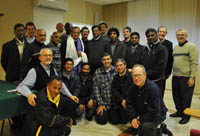

In speaking to them, Fr Pascual Chávez pointed out that their being missionaries was not a personal decision but a response to the commandment of the Lord who sent his disciples to be witnesses to him “until the ends of the earth” (Acts 1,8). “You are being sent; it is not a personal project but a gift.” The first attitude this requires is to become immersed in the local culture if you want the Gospel to penetrate and produce fruit. Being a Salesian missionary is not doing a job, but “working for the salvation especially of the young,” “it’s enough that in a country there are young people for the Salesians to be present.”
“Nowadays, being missionaries means dialoguing with the culture, setting out to know the language. It is necessary to show yourself to be very humble, to be like a child who has to learn how to speak, because the language is the way in which the culture is expressed.” It is necessary to put aside one’s own original culture and to have as the missionary model Jesus: “Who stripped himself of everything...”to fully share the life of those to whom he was sent (cf. Phil 2,6-11).
It is important that the Salesian missionary “takes care of his health and learns how to rest,”, the Rector Major said quoting Don Bosco: “We have to work hard... but over a long period.” The Salesian missionary needs to take care of his spiritual life in order to cope with the problems he meets with more strength and wisdom: “Being disciples first in order to be apostles afterwards.” Fundamentally it is the community which offers great help, psychological and spiritual support for fidelity to one’s own vocation.
There was then Mass at which Fr Guillermo Basañes, Regional Councillor for Africa-Madagascar presided and a visit to the Central Archives guided by Fr Luigi Cei.
The final stage of the updating course for the missionaries which has lasted for about 11 weeks will be a pilgrimage to the Holy Land during the first week of December.
Published 30/11/2010
